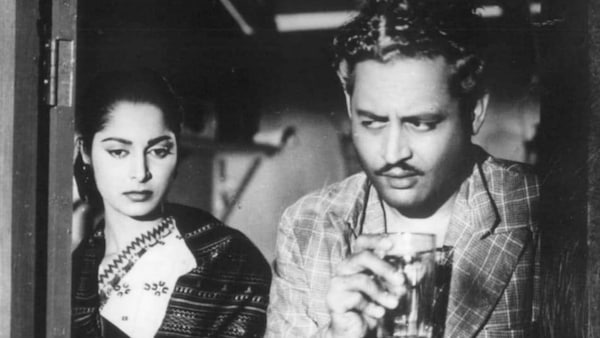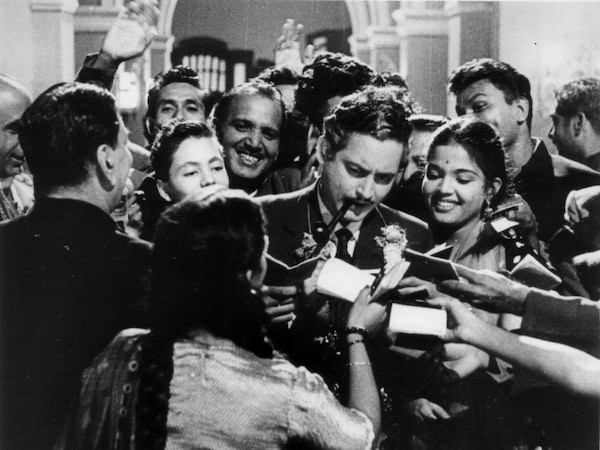Chup: 'Dismal', 'incoherent', 'funeral-paced' - This was the 1959 review of Guru Dutt's seminal Kaagaz ke Phool
As R. Balki's 'Chup: Revenge of the Artist' draws inspiration from the 1959 classic, let's take a moody glance at what the reviews of the Guru Dutt film read back then

The ever-radiant Waheeda Rehman with the auteur Guru Dutt in a still from Kaagaz Ke Phool
Last Updated: 12.03 AM, Sep 20, 2022
The 'Revenge of the Artist' is somewhat a pulpy theme at first encounter but when looked deeper, an element of catharsis shows through prominently. For writer-director R. Balki, the same concept of revenge is also vigilante-like justice and as the trailer of Chup! reveals, film critics are suddenly at peril this time for all their antics as the anguish of an artist hunts them down. And the film too comes at a time when meaningful discourse is diminishing at a rapid pace and critics emerge out of every individual via social media, thus taking the value of merit and deeper understanding entirely out of the equation.
It's interesting that Balki, while making his point, refers to one of the greatest and most persuasive filmmakers of Indian cinema and a six-decade-old film. We talk of the late Guru Dutt here who, following the debacle of his 1959 film Kaagaz Ke Phool, wallowed in so much grief and self-pity that he eventually succumbed to alcoholism and prescription-drug addiction a few years later, with many of his passions still unquenched. And R. Balki, almost 63 years later, asserts that the power to critique a piece of work comes with responsibility but in most cases, it quickly switches to gross abuse of power. Hollywood often crudely refers to this as the 'Heaven's Gate' factor, alluding to the colossal failure that Michael Cimino met at the hands of fate and further implying that an artist's life is as fragile as glorious it is.

But what went wrong in Guru Dutt's case and why is Kaagaz ke Phool a seminal film for myriad reasons?
One must first understand that Guru Dutt's vision is known to have often subverted the expectations of his era. As someone who always sought to merge the common rhetoric and the whimsical in cinema, Dutt was a pioneer, an auteur, and even a congenial provocateur. It was his distinct gaze, along with that of his frequent collaborator Dev Anand, that introduced noir to Indian cinema in the early 1950s with Jaal and also ensured that the masses related to what they saw on the big screen: in other words, his films were commercially viable as well. Films like Aar Paar, Mr. & Mrs. 55, and Pyaasa followed Dutt's initial exploits and soon enough, one reckoned that the 1950s were a period of radical change in both Hindi and Indian cinema.
Guru Dutt was at the fore of this subtle cultural shift and also starkly different from his contemporaries like Raj Kapoor and Dilip Kumar. His films were about the individual and the isolated whereas both Raj Kapoor and Dilip Kumar, even just as actors, attempted at stories about the larger society in sight with films such as Naya Daur, Ganga Jumna, Shri 420, and others echoing the ethos of the newly independent India. But for Dutt, cinema served a deeper and more personal purpose and the manifestation of it all, quite perhaps, came in the form of Kaagaz Ke Phool.
In many ways, Kaagaz Ke Phool can be seen as Guru Dutt's account of his own disillusionment with fame, success, and love. It is inherently autobiographical wherein it draws references to several real-life incidents and is even set in a world that he was most familiar with - Hindi cinema. Dutt plays Suresh Sinha, the film's protagonist who is a major film director, with a strong sense of familiarity but is also mindfully distanced from the character and interestingly, the film-within-the-film that Suresh Sinha is striving to make is Devdas, a defining tale of hope and despondency for the post-British India. And just in Dev's case, Sinha Babu too foregoes love (played by the radiant Waheeda Rahman) inadvertently because of egotism. Introspective much? Well, that's what the audience felt too at the time as both the critics and audiences felt that the film was relentlessly incoherent and self-indulgent, eventually making it a major critical and commercial failure.
"Guru Dutt Films’ Kaagaz Ke Phool is a dismal incoherent funeral-paced picture which has hardly anything more remarkable about it than that it is the first Indian picture to be made in cinemascope, a process designed to provide an image that has more than twice as much width as height and to which squint-eyed spectators can perhaps do more justice than those with normal eyes." The 1959 review of Kaagaz Ke Phool in the famous Filmindia magazine (info. borrowed from upperstall.com).
However, this wasn't the first dismal review that Guru Dutt faced from the critics. His second venture as a producer C.I.D wherein he also starred in the lead role was described as a 'stupid crime tale that was as thin as air and as unconvincing as a Russian prisoner’s confession.'! The 1956 film Sailaab, which Dutt directed, was dismissed as 'boring, stupid, and incoherent' and that 'as an entertainment, it is miserably amateurish but as a torture it is perfect': and yet, the failure of and criticism toward Kaagaz Ke Phool is said to have cast a dark impact on Dutt who gradually spiralled down into submission and misery that he never took on direction again.
The Legacy
But Kaagaz Ke Phool rose from the ashes, so to speak, and was eventually anointed a masterpiece by the future audience (including). The 2002 Sight & Sound critics and directors' poll ranked the film the top 160 greatest films of all time and the British Film Institute named Kaagaz Ke Phool the best musical of 1959: while Guru Dutt himself did not survive long enough to witness the revision, his aching passion became a benchmark for subsequent generations.
Chup: Revenge of the Artist is written and directed by R. Balki and stars Sunny Deol, Dulquer Salman, Shreya Dhanwanthary, and Pooja Bhatt. The film releases theatrically on September 23.

